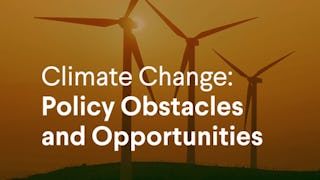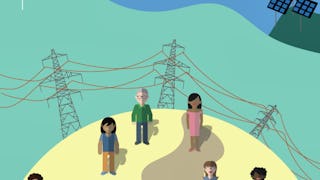The Global Energy and Climate Policy course offers an introduction to the theoretical and practical understanding of how energy and climate change policies are designed, shaped, advocated and implemented. As energy markets go truly global, domestic energy policies are becoming more and more entangled with wider issues of international governance. Concurrently, the urgent need to mitigate and adapt to climate change and transition to a low-carbon future is adding a further layer of complexity.



(687 reviews)
Skills you'll gain
Details to know

Add to your LinkedIn profile
See how employees at top companies are mastering in-demand skills

There are 6 modules in this course
This week introduces the concept of a carbon-constrained world, considering how it links to energy policies and the future of fossil fuels. It will also discuss the role of technologies such as carbon capture and storage (CCS) and how different stakeholders, in developed and developing countries, perceive the need to decarbonize energy systems.
What's included
6 videos3 readings1 peer review1 discussion prompt
This week introduces the competing cases on economic, environmental and political aspects of nuclear power as part of the global energy mix and its role in meeting both energy security and climate change mitigation needs.
What's included
3 videos1 reading1 peer review1 discussion prompt
This week discusses the growing role of renewable energy sources such as wind and solar. It introduces the range of fiscal and other policy tools that governments’ use to promote an increase in the production and consumption of renewable energy.
What's included
3 videos1 reading1 peer review
This week addresses how energy and climate governance are becoming more inter-related. Climate change is a global collective action problem whereas energy is more often associated with state based priorities. However, emissions from fossil fuel energy have global impacts and pose a challenge to the international community at-large.
What's included
2 videos1 reading1 peer review
This week provides an introduction to the various conceptualisations of energy security and considers the implications these can have on energy and climate change strategies.
What's included
3 videos1 reading1 peer review
For the week 6 optional exercise, you may draw upon your learning from previous weeks to understand how climate change is changing the focus of energy policy. Specifically, you are asked to consider this in light of the 2015 Paris Agreement on climate change.
What's included
4 videos1 reading1 peer review
Earn a career certificate
Add this credential to your LinkedIn profile, resume, or CV. Share it on social media and in your performance review.
Instructors


Explore more from Governance and Society
 Status: Free Trial
Status: Free Trial
Council on Foreign Relations
 Status: Free Trial
Status: Free Trial
University of Colorado Boulder


University of Cape Town
Why people choose Coursera for their career




Learner reviews
687 reviews
- 5 stars
75.69%
- 4 stars
17.61%
- 3 stars
4.07%
- 2 stars
1.31%
- 1 star
1.31%
Showing 3 of 687
Reviewed on Nov 13, 2022
Overview on global climate and energy policy are excellent. For beginners this course gives you a clear view of and study materials. Well described by the article and interesting video!
Reviewed on Jan 4, 2023
Really useful and interesting overview of matters relating to global climate and energy policy and their inter-linkages. Well worth doing for anyone (and everyone!) with an interest in this area
Reviewed on Jun 24, 2020
Awesome time studying this MOOC. I loved Dr. Harold's approach and line of questioning to facilitators. It helped me read in between the lines and find my stance on some of these complex issues.

Open new doors with Coursera Plus
Unlimited access to 10,000+ world-class courses, hands-on projects, and job-ready certificate programs - all included in your subscription
Advance your career with an online degree
Earn a degree from world-class universities - 100% online
Join over 3,400 global companies that choose Coursera for Business
Upskill your employees to excel in the digital economy
Frequently asked questions
Access to lectures and assignments depends on your type of enrollment. If you take a course in audit mode, you will be able to see most course materials for free. To access graded assignments and to earn a Certificate, you will need to purchase the Certificate experience, during or after your audit. If you don't see the audit option:
The course may not offer an audit option. You can try a Free Trial instead, or apply for Financial Aid.
The course may offer 'Full Course, No Certificate' instead. This option lets you see all course materials, submit required assessments, and get a final grade. This also means that you will not be able to purchase a Certificate experience.
When you purchase a Certificate you get access to all course materials, including graded assignments. Upon completing the course, your electronic Certificate will be added to your Accomplishments page - from there, you can print your Certificate or add it to your LinkedIn profile. If you only want to read and view the course content, you can audit the course for free.
You will be eligible for a full refund until two weeks after your payment date, or (for courses that have just launched) until two weeks after the first session of the course begins, whichever is later. You cannot receive a refund once you’ve earned a Course Certificate, even if you complete the course within the two-week refund period. See our full refund policy.
More questions
Financial aid available,






